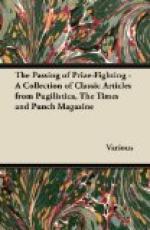I believe that the question of establishing a censorship of artists’ names has been seriously considered by Dr. ADDISON, in view of its bearing on public hygiene, and that he estimates the cost of staffing the new department as not likely to exceed seven hundred and fifty thousand pounds a year. Still, in these days when State economy is so needful, it would be better if the desired effect were attained by the pressure of enlightened public opinion rather than by the operations of even so inexpensive a department as that contemplated by the MINISTER OF HEALTH.
* * * * *
=IN FLANDERS FIELDS.=
These famous verses, which originally appeared in Punch, December 8th, 1915, being the work of a Canadian officer, Lieut.-Colonel MCCRAE, who fell in the War, have been subjected to so many perversions—the latest in a letter to The Times from a Minister of the Crown, where the closing lines are misquoted as follows:
“If ye break faith with those of
us who died,
We shall not sleep, though poppies bloom
in fields of France”—
that Mr. Punch thinks it would be well to reproduce them in their correct form:—
In Flanders fields the poppies blow
Between the crosses, row on row,
That mark our place; and in
the sky
The larks, still bravely singing,
fly
Scarce heard amid the guns below.
We are the Dead. Short days ago
We lived, felt dawn, saw sunset glow,
Loved and were loved, and
now we lie
In
Flanders fields.
Take up our quarrel with the foe:
To you from failing hands we throw
The torch; be yours to hold
it high.
If ye break faith with us
who die
We shall not sleep, though poppies grow
In
Flanders fields.
* * * * *
=AT THE PLAY.=
“FEDORA.”
It may or may not be well that the War has modified our estimate of the value of life; but it is a bad thing for the legitimate drama. And in the case of Fedora the bloody regime of LENIN has so paled our memory of the terrors of Nihilism that SARDOU’S play seems almost further away from us than the tragedy of Agamemnon. In our callous incapacity to be thrilled by the ancient horrors of forty years ago we fall back on the satisfaction to be got out of the author’s dexterity in the mechanics of his craft.
And here the critic’s judgment is also apt to be more cold-blooded. He recognises the crude improbability of certain details which are essential to the tragic development of the play. The death of Count Vladimir (accented on the first or second syllable according to the temporary emotion of the speaker) was due to the discovery of a letter in an unlocked drawer where it could never possibly have been thrown, being an extremely private letter of assignation. The death of Fedora, again,




